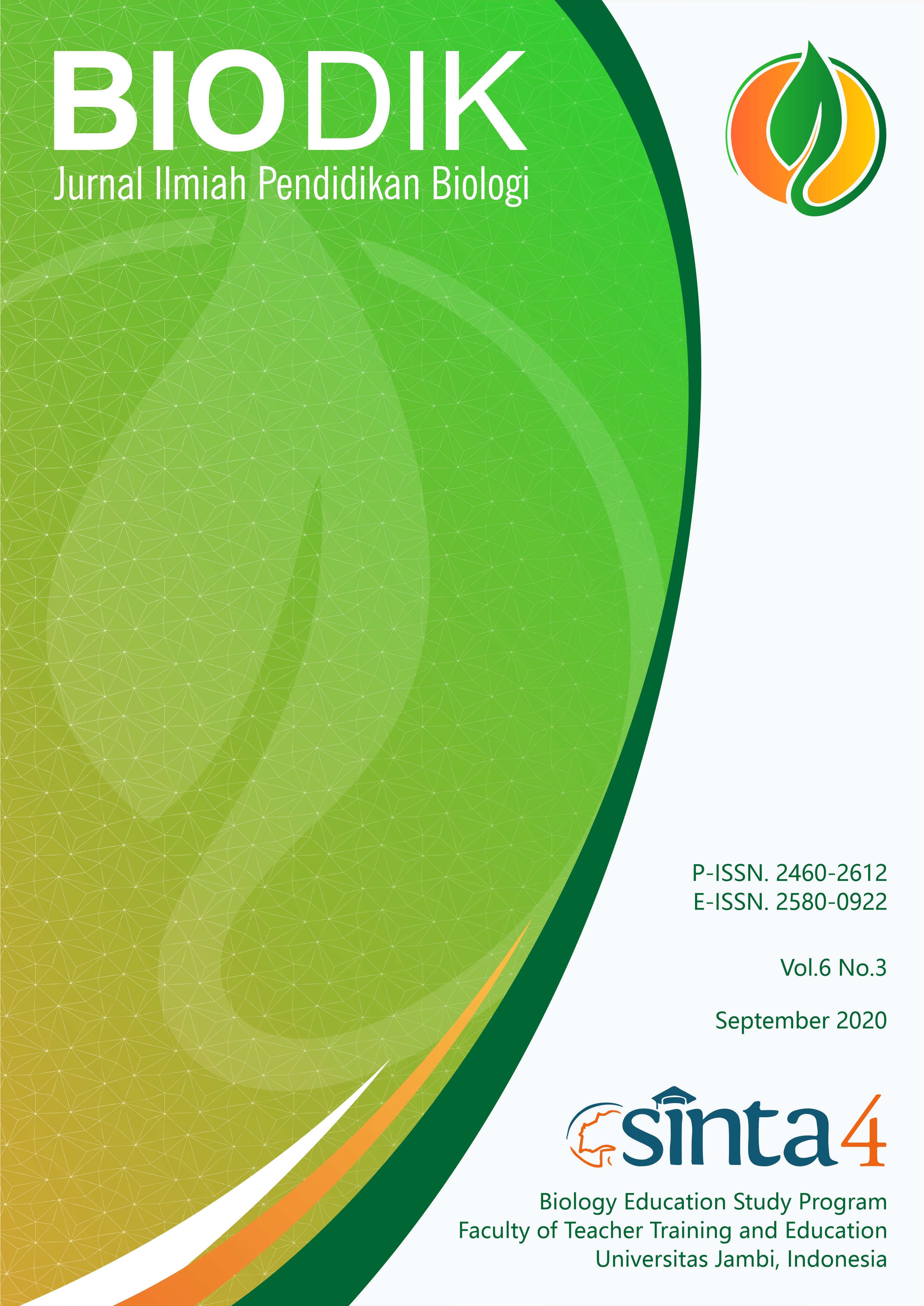Instrumen Asesmen Bagi Pendidik Dalam Proses Pembelajaran Biologi Berbasis Problem Based Learning
(Assessment Instruments for Teacher in Biology Learning Process by Problem Based Learning)
DOI:
https://doi.org/10.22437/bio.v6i3.9806Abstract
This study aims to produce PBL based assessment instruments (problem based learning) that are made to measure learning process for educators, in this case, the researcher will focus on the discussion about attitude. This research is an instrument development research adapted from ADDIE model, this model there are 5 stages: analysis, design, development, implementation and evaluation. Data collection and data analysis using different questionnaires and given to expert / expert teams and users of assessment instruments. To find out the feasibility of the instrument, the questionnaire was given to 3 expert teams / experts and got the score category 88%, then the score result on the assessment instrument is "Eligible" is used, instruments are also strengthened by small group and field trials. To find out the effectiveness and practicality of the disseminated instrument to several schools (implementation) of the instrument, the effectiveness questionnaire was given to 3 principals / users and obtained the score category 88%, then the scores result of the assessment instrument is "very Effective". In order to know the practicality of the instrument, the questionnaire of practicality was given to 3 principals / users and obtained the score category of 88%, then the scores result of the assessment instrument is "Very Practical".
Abstrak. Penelitian ini bertujuan menghasilkan instrumen asesmen berbasis PBL (problem based learning) yang dibuat untuk mengukur proses pembelajaran bagi pendidik, dalam hal ini, peneliti akan memfokuskan pada pembahasan tentang sikap. Penelitian ini merupakan penelitian pengembangan instrumen yang diadaptasi dari model ADDIE, model ini terdapat 5 tahap yaitu: analysis, design, development, implementation dan evaluation. Pengumpulan data dan analisis data menggunakan angket yang berbeda dan diberikan kepada tim ahli/pakar dan pengguna instrumen asesmen. Untuk mengetahui kelayakan instrumen, angket diberikan ke 3 tim ahli/pakar dan didapatkan kategori skor 88%, maka hasil skor terhadap instrumen asesmen ini adalah “Layak†digunakan, kelayakan instrumen diperkuat juga dengan adanya uji coba kelompok kecil dan lapangan. Untuk mengetahui keefektifan dan kepraktisan instrumen disebar kebeberapa sekolah (implementasi), angket efektifitas diberikan ke 3 kepala sekolah/pengguna dan didapatkan kategori skor 88%, maka hasil skor terhadap instrumen asesmen ini adalah “Sangat Efektifâ€. Untuk mengetahui kepraktisan instrumen, angket praktikalitas diberikan ke 3 kepala sekolah/pengguna dan didapatkan kategori skor 88%, maka hasil skor tersebut diperoleh bahwa penilaian oleh kepala sekolah terhadap instrumen asesmen ini adalah “Sangat Praktisâ€.
Downloads
References
Anonim. (2009). Al-Qur’an dan Terjemahnya. Bandung: PT. Sygma Ekamedia
Astuti, W. P., Prasetyo, A. P. B., & Rahayu, E. S. (2012). Pengembangan Instrumen Asesmen Autentik Berbasis Literasi Sains pada Materi Sistem Ekskresi. Lembaran Ilmu Kependidikan, 41(1).
Athurrohman, M. (2015). Model-Model Pembelajaran Inovatif. Jogyakarta: Ar-Ruzz Media.
Colliver, J. A. (2000). Effectiveness of problem-based learning curricula: research and theory. Academic medicine, 75(3), 259-266
Firdaos, R. (2016). Desain Instrumen Pengukur Afektif. Lampung: Anugrah Utama Raharja (AURA).
Fujika, A., Anggereini, E., & Budiarti, R. S. (2015). Analisis Kemampuan Berpikir Kritis Siswa Sma N 5 Kota Jambi Melalui Pembelajaran Berbasis Masalah Pada Konsep Pencemaran Lingkungan. BIODIK, 1(1).
Hartono, R. (2013). Ragam Model Mengajar yang Mudah Diterima Murid. Yogyakarta: DIVA press.
Herabudin, M. P. (2002). Administrasi & Supervisi Pendidikan. Bandung: CV. Pustaka Setia.
Jelahut, M. S., & Suyata, S. (2015). Evaluasi Kinerja Guru Matematika SMP Bersertifikat Pendidik di Kabupaten Bantul. Jurnal Evaluasi Pendidikan, 3(2), 146-156.
Julianingsih, Suhaesti.(2017) "Pengembangan Instrumen Asesmen Higher Order Thinking Skill (HOTS) untuk Mengukur Dimensi Pengetahuan IPA Siswa Di SMP.".
Masaong, K. (2002). Supervisi Pembelajaran dan Pengembangan Kapasitas Guru. Bandung: ALFABETA.
Mudlofir, A. (2016). Desain Pembelajaran Inovatif. Jakarta: Rajawali Pers.
Mulyatiningsih, E. (2014). Metode Penelitian Terapan Bidang Pendidikan. Bandung: Alfabeta.
Riduwan. (2013). Dasar-dasar Statistika. Bandung: Alfabeta.
Sani, R. A. (2015). PEMBELAJARAN SAINTIFIK untuk IMPLEMENTASI KURIKULUM 2013. Jakarta: PT. Bumi Aksara.
Sugiyono. (2009). Metode Penelitian Pendidikan. Bandung: Alfabeta.
Supardi. (2016). Penilaian Autentik. Jakarta: Rajawali Pers.
Tirtahardja, U. (2012). Pengantar Pendidikan. Jakarta: PT. Rineka Cipta.
Uno, H. B. (2014). Assessment Pembelajaran. Jakarta: Bumi Aksara.
Yamin, M. (2013). Paradigma Baru Pembelajaran. Jakarta: Referensi.
Downloads
Published
Versions
- 2020-10-12 (4)
- 2020-10-12 (3)
- 2020-10-12 (2)
- 2020-10-12 (1)
How to Cite
Issue
Section
License
Copyright (c) 2020 try susanti

This work is licensed under a Creative Commons Attribution-NonCommercial-ShareAlike 4.0 International License.
Copyright Notice
Authors who publish with Biodik : Jurnal Ilmiah Pendidikan Biologi agree to the following terms:
- For all articles published in Biodik : Jurnal Ilmiah Pendidikan Biologi, copyright is retained by the authors and grant the journal right of first publication with the work simultaneously licensed under a Creative Commons Attribution-ShareAlike 4.0 International Licensethat allows others to share the work with an acknowledgment of the work's authorship and initial publication in this journal.
- Authors are able to enter into separate, additional contractual arrangements for the non-exclusive distribution of the journal's published version of the work (e.g., post it to an institutional repository or publish it in a book), with an acknowledgment of its initial publication in this journal.
- Authors are permitted and encouraged to post their work online (e.g., in institutional repositories or on their website) prior to and during the submission process, as it can lead to productive exchanges, as well as earlier and greater citation of published work (See The Effect of Open Access).
















